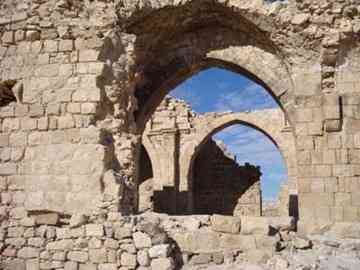European experts and local officials are looking to develop the southern city of Shobak into an emerging tourism destination.
 The project, led by the University of Florence in association with the Shobak Municipality and the EU, aims to take advantage of the historical value and natural beauty of the southern town in order to bolster local development, according to organisers.
The project, led by the University of Florence in association with the Shobak Municipality and the EU, aims to take advantage of the historical value and natural beauty of the southern town in order to bolster local development, according to organisers.
Situated on the road to the rose-red city of Petra, Shobak is best known for its Crusader castle, once part of a chain of fortresses stretching across Jordan.
However, the castle and town’s Ottoman-era homes are often overlooked by tour groups who shuttle in and out of Wadi Musa to see Petra a few miles away.
Michele Nucciotti, an archaeologist from the University of Florence, which has been working on developing the archaeology of the town over the last several years, said the project aims to introduce the area to tourists.
"Shobak has a tourist and historical value that has been overlooked. Our job is to develop the city and prepare it for the prominence it deserves,” he said, referring to Shobak Castle as one of the best preserved existing crusader castles.
As part of the project, officials will work to enhance facilities in the castle to enable it to accommodate larger numbers of tourists. Restoration experts will also work to renovate Ottoman and Mamluk buildings in the town for some to be converted into small-scale tourism businesses, he added.
Nucciotti said that the city can become a vital addition to the Kingdom’s mosaic of diverse historical and natural sites.
“This is a marvellous place, and is very unique in terms of location, environment and the ruins that have been left here,” he told The Jordan Times over the phone.
Also as part of the project, local residents are expected to receive hospitality training in order to better receive visitors from across the world.
"Shobak can follow model of historical European cities in terms of generating income for the local community," he added.
Nucciotti said Shobak has the potential to attract Western tourists due to its historical location at the crossroads of Euro-Mediterranean cultures.
Originally known as Montreal, Shobak Castle was built in the early 12th century by Baldwin I of Jerusalem as a Crusader stronghold of what was then considered “Arabia”, standing at the ancient crossroads between the Gulf of Aqaba, Damascus and Mecca.
After succumbing to a two-year siege by armies led by Salah Addin in 1189, the castle fell into disrepair before being taken over and renovated by the Mamluks in the 14th century.
Author: Mohammad Ben Hussein | Source: The Jordan Times [October 31, 2010]